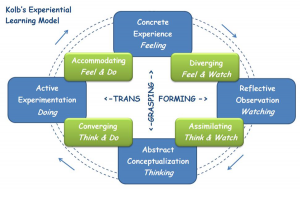Experiential Learning Theory
Experiential Learning Theory (ELT) defines learning as “the process whereby knowledge is created through the transformation of experience. Knowledge results from the combination of grasping and transforming experience “ (Passarelli & Kolb)

W.B. Pearce 2014
Experiential Learning Theory (ELT) constructs upon six propositions (Kolb & Kolb. 2005)
- Learning is best conceived as a process, not in terms of outcomes
- All learning is relearning
- Learning requires the resolution of conflicts
- Learning is a holistic process of adaptation to the world
- Learning results from synergetic transactions between the person and the environment
- Learning is the process of creating knowledge
Learning Styles and Learning Spaces: Enhancing Experiential Learning in Higher Education. Alice Y. Kolb and David A. Kolb Academy of Management Learning & Education, Vol. 4, No. 2 (Jun., 2005), pp. 193-212
Using Experiential Learning Theory to Promote Student Learning and Development in Programs of Education Abroad. Passarelli, A. & Kolb, D. Retrieved from http://weatherhead.case.edu/departments/organizational-behavior/workingPapers/WP-11-03.pdf